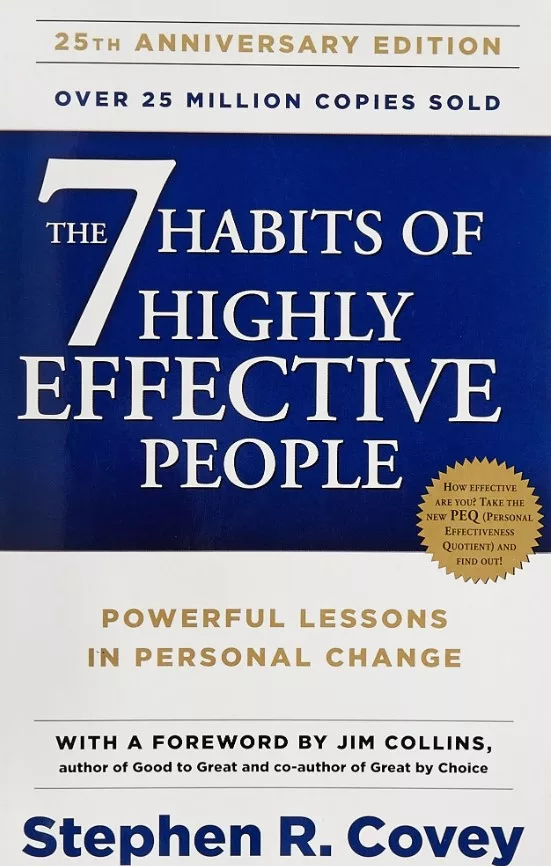Ever wondered why some people seem to have it all figured out? They excel in their careers, maintain healthy relationships, and seem incredibly fulfilled. The secret sauce? It might just be their habits. Stephen Covey’s seminal book, The 7 Habits of Highly Effective People, provides a roadmap for personal effectiveness and true success. So, if you’re not one for reading 400+ pages, stick around for this thorough breakdown.
The societal definitions of success often orbit around the acquisition of wealth, prestige, or fame. However, Covey presents an alternate perspective where true success is an amalgamation of personal and professional growth, balanced relationships, and a deep sense of fulfilment. According to Covey, success isn’t a destination but a continuous journey of becoming the best version of yourself. It involves self-mastery, cultivating meaningful relationships, and making a positive impact on the world.
-
Source: Franklin Covey
The Role of Paradigms
Paradigms are like the mental maps we use to navigate our lives. They are shaped by our experiences, beliefs, and values. Covey points out that if we operate from incorrect paradigms, our maps will lead us astray. One of the most significant shifts he advocates for is the change from a “scarcity mindset” to an “abundance mindset.” In a scarcity mindset, life is a zero-sum game; if someone else wins, you lose.
An abundance mindset, on the other hand, posits that there is enough success to go around for everyone. Another paradigm shift involves taking personal responsibility for our actions rather than blaming external factors. This shift is vital for true effectiveness and empowerment.
Key Takeaway: Be willing to examine and change your paradigms. Shift from scarcity to abundance and from blame to responsibility to become more effective in life.
Importance of Principles
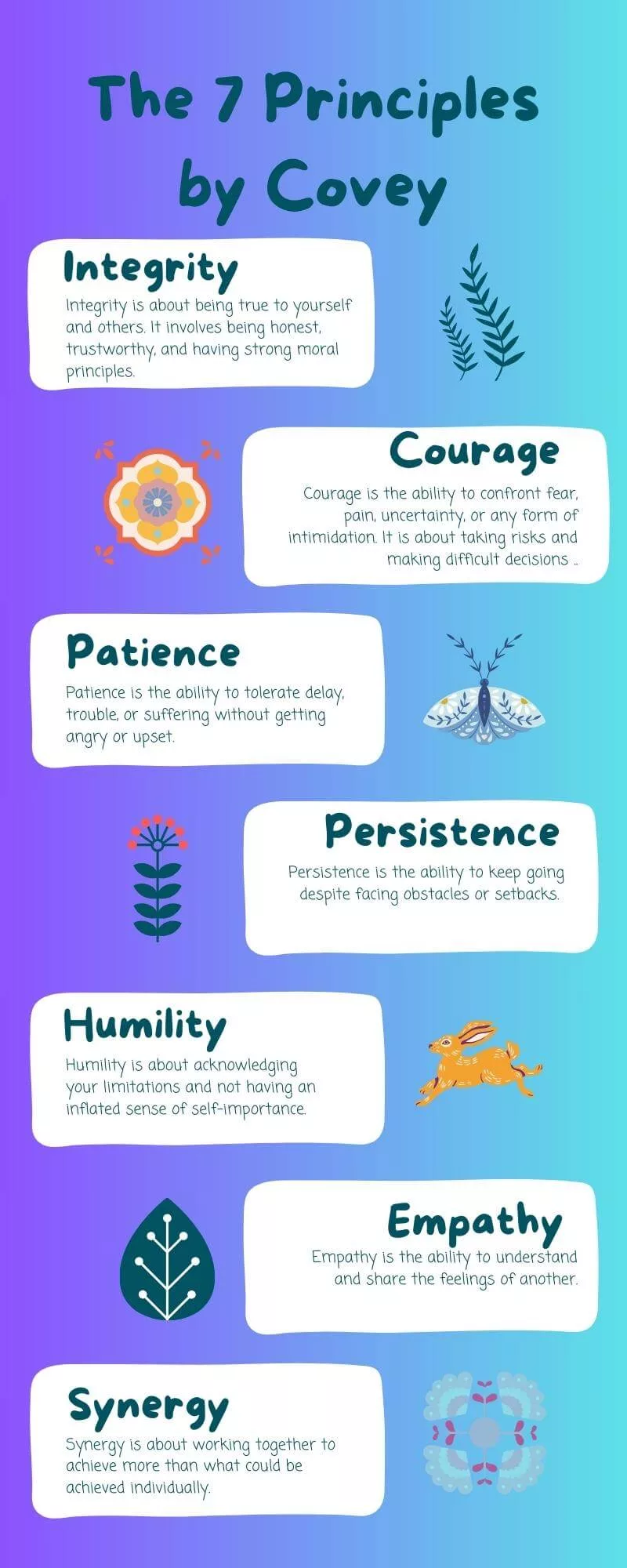

Principles are the universal truths that act as the bedrock upon which our lives must be built to achieve enduring success. Unlike practices or skills that may change or evolve, principles like honesty, integrity, respect, and fairness are unchanging and provide a stable foundation for decision-making and actions.
Covey suggests that living a principle-centered life is crucial for long-term effectiveness. When we align our actions with these principles, we are not merely looking for short-term gains. We’re investing in a legacy of character and positive influence.
1. Integrity
Integrity is about being true to yourself and others. It involves being honest, trustworthy, and having strong moral principles. It means doing the right thing even when no one is watching. Integrity builds trust, which is foundational for any meaningful relationship, whether personal or professional.
2. Courage
Courage is the ability to confront fear, pain, uncertainty, or any form of intimidation. It is about taking risks and making difficult decisions even when it is uncomfortable. Courage is essential for stepping out of your comfort zone, taking on new challenges, and growing as an individual.
3. Patience
Patience is the ability to tolerate delay, trouble, or suffering without getting angry or upset. It involves staying calm and composed even in difficult situations. Patience is crucial for dealing with challenges, setbacks, and working with others effectively.
4. Persistence
Persistence is the ability to keep going despite facing obstacles or setbacks. It involves staying committed to your goals and not giving up even when things get tough. Persistence is key to overcoming challenges and achieving long-term success.
5. Humility
Humility is about acknowledging your limitations and not having an inflated sense of self-importance. It involves being open to learning from others and admitting when you are wrong. Humility is essential for continuous growth and building strong, collaborative relationships.
6. Empathy
Empathy is the ability to understand and share the feelings of another. It involves putting yourself in someone else’s shoes and viewing situations from their perspective. Empathy is crucial for effective communication, resolving conflicts, and building strong relationships.
7. Synergy
Synergy is about working together to achieve more than what could be achieved individually. It involves valuing the SWOT and contributions of others and collaborating to create better solutions. Synergy is key to achieving collective goals and fostering a positive, supportive work environment.
Key Takeaway
Living by these principles is not just about achieving short-term success; it’s about creating a life of lasting fulfillment and positive impact. By internalizing and living by these principles, you build a strong foundation for personal effectiveness, meaningful relationships, and true success. Ultimately, these principles help you become a better version of yourself, a person who can make a positive difference in the world.
The Changing Landscape of Success – Character Ethic vs. Personality Ethic
Ever notice how self-help literature has changed over the years? Before the 1920s, it was all about character. Nowadays, it’s all about quick tips and charisma. Covey points out that for genuine effectiveness and happiness, we need to shift back to focusing on character.
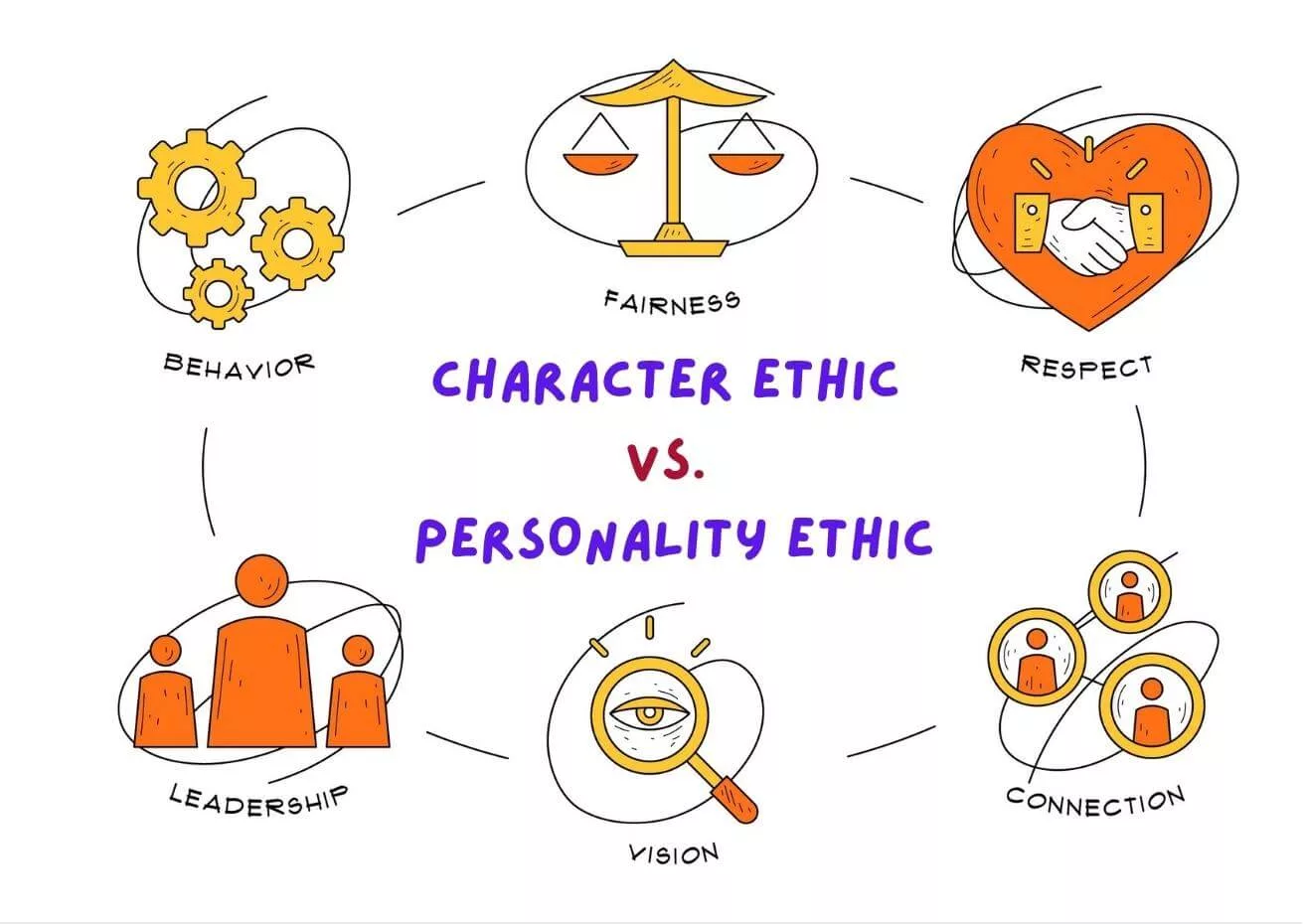

Character Ethic
Before the 1920s, the prevailing wisdom around success hinged on intrinsic qualities known as the Character Ethic. These included virtues such as integrity, courage, patience, and other moral attributes. The belief was that true effectiveness and meaningful success emanated from a solid foundation of these enduring principles. People focused on personal development through cultivating these foundational traits, which were viewed as the pathway to achieving genuine success and happiness.
Personality Ethic
Around the 1920s, a noticeable shift occurred. Success started to be viewed less as a function of intrinsic character and more as a matter of public perception. The focus moved toward mastering techniques and strategies to influence people, manage public relations, and project an appealing persona. This era, dominated by the Personality Ethic, focused on surface-level qualities—how to speak, how to dress, how to behave—often neglecting the foundational principles of true character.
The Problem with Quick Fixes
In modern times, people often seek instant remedies, techniques, and hacks to achieve success. They look for templates that successful people or organizations have used. While these may offer a temporary uplift in results or public perception, they don’t lead to enduring effectiveness or fulfillment because they fail to address the underlying issues. They are akin to applying a band-aid to a deep wound; it may cover the problem but won’t heal it.
The Paradigm Shift: Return to the Basics
Covey argues that for genuine, lasting change to occur, we must revert to focusing on fundamental principles. This requires a paradigm shift: a change in underlying beliefs and values. It means moving away from surface-level fixes and back to the foundational attributes of character. In doing so, one doesn’t merely change their actions but transforms their very being, leading to long-lasting effectiveness.
What are the Seven Habits?
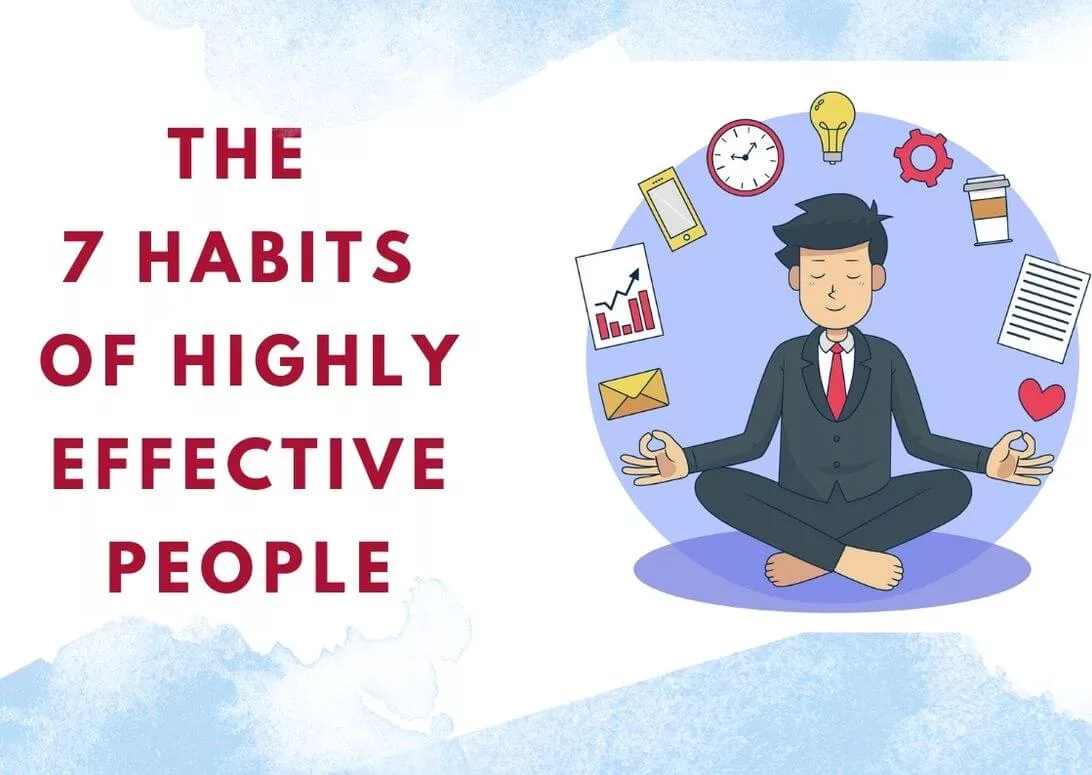

Stephen Covey identifies a critical shift in the understanding of success: from the Character Ethic that emphasizes fundamental virtues, to the Personality Ethic that focuses on superficial qualities and quick fixes. To achieve authentic, lasting success, Covey argues that we need to return to the foundational principles of character. We require a deep-seated change in our paradigms or belief systems. This return to fundamentals is the core of his Seven Habits of Highly Effective People.
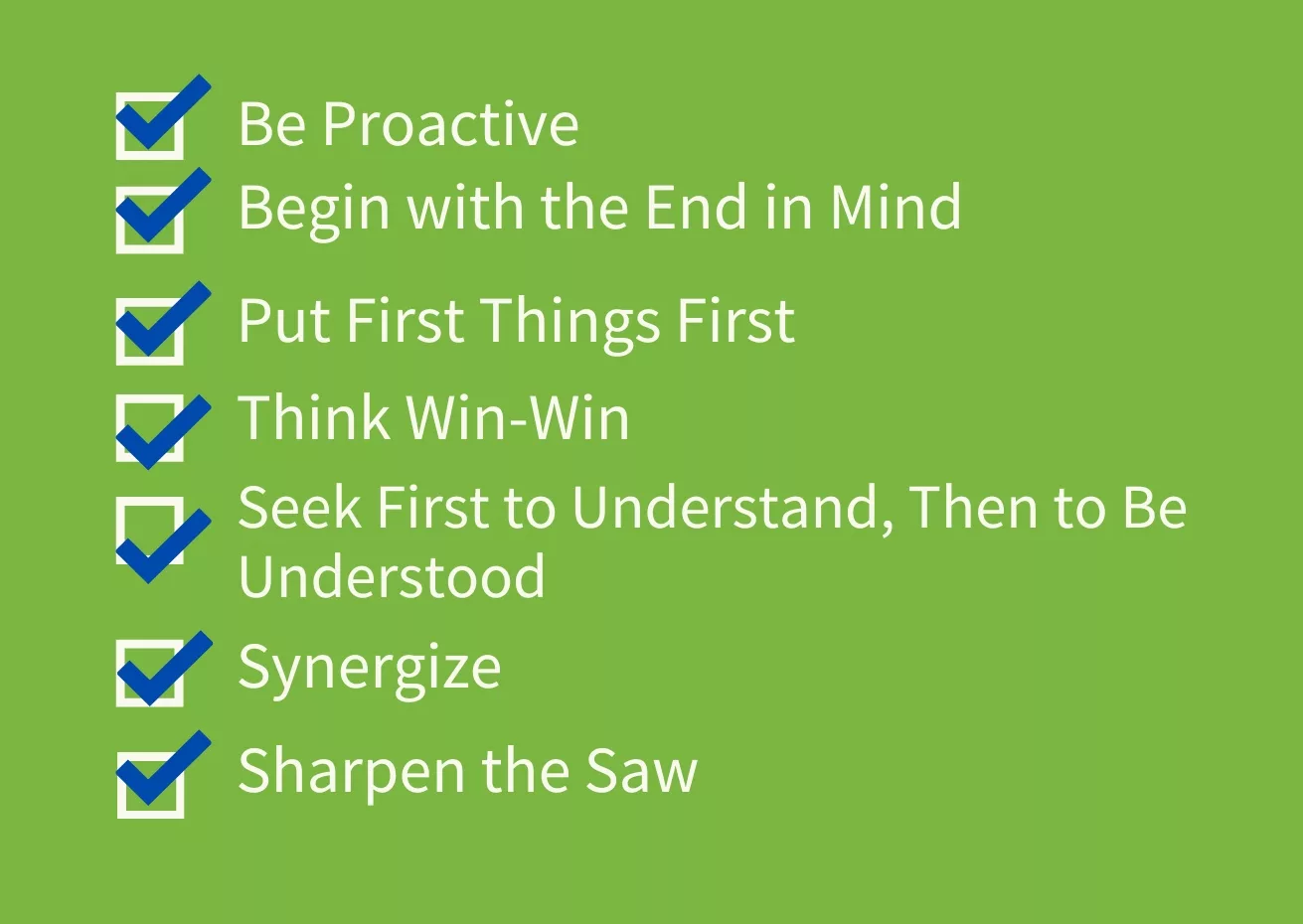

Understanding these foundational elements is the first step in integrating Covey’s seven habits into your life. When you redefine what success means, shift your paradigms to empower yourself, and build your life on a foundation of solid principles.
You set yourself on a path of true effectiveness—personally and professionally. This is not just about achieving your goals; it’s about becoming the kind of person who can consistently set, meet, and exceed those goals throughout your life.
1. Be Proactive
Being proactive is the cornerstone of personal effectiveness. It’s about taking control of your life by focusing on what you can influence rather than lamenting over what you can’t. Proactivity extends beyond taking the initiative; it involves choosing your responses in any given circumstance.
Key Concepts
- Circle of Influence vs. Circle of Concern: Focus your energy on your Circle of Influence, which contains matters you can actually affect, rather than the broader Circle of Concern, filled with issues beyond your control.
- Proactive vs. Reactive Focus: Proactive people grow their Circle of Influence by concentrating on actionable steps, while reactive people shrink theirs by blaming external factors.
Key Lessons
- Shift Your Language: Replace reactive language with proactive language. Instead of saying, “He makes me so mad,” rephrase it as, “I control my own feelings.”
- Turn Reactive Tasks Into Proactive Ones: Look for opportunities in your daily life where you can convert reactive behaviors into proactive actions.
With the first habit, Covey begins with a foundational shift in mindset—from a reactive approach that makes us susceptible to our environment, to a proactive one where we become the architects of our lives.
2. Begin with the End in Mind
This habit revolves around setting long-term goals and creating a mission statement that guides your daily decisions and actions. It’s about being clear on your ultimate objectives so that your present choices align with your future aspirations.
Key Concepts
- Personal Mission Statement: A succinct declaration of your core values and objectives, serving as a roadmap for your life.
- Value-Centered Living: Prioritize actions based on values rather than reactive emotional states or immediate circumstances.
Key Lessons
- Identify Core Values: List out your core values and see how they align with your daily activities.
- Draft a Personal Mission Statement: Take the time to articulate a personal mission statement that serves as a guiding light for your decisions.
3. Put First Things First
This habit involves prioritizing tasks based on their importance rather than urgency, thereby aligning your daily actions with your long-term goals and values. It encourages effective time and resource management.
Key Concepts
- Time Management Matrix: Classify tasks into four quadrants based on their urgency and importance to prioritize effectively.
- Task Prioritization: Focus on important but non-urgent tasks that align with your end goals.
Key Lessons
- Sort Tasks: Use the Time Management Matrix to categorize and prioritize your daily tasks.
- Set Boundaries: Learn to say ‘no’ to unimportant and urgent tasks that don’t align with your core objectives.
4. Think Win-Win
This habit encourages an abundance mindset, promoting mutual benefit in interpersonal interactions. It’s about crafting solutions where all parties involved can benefit, fostering a cooperative environment.
Key Concepts
- Abundance Mindset: Believe that there’s enough success to go around, rather than a zero-sum competition.
- Mutual Benefit: Seek agreements and solutions that are beneficial for all parties involved.
Key Lessons
- Check Your Paradigms: Are you thinking win-lose, lose-win, or win-win in your relationships? Reevaluate your approach.
- Negotiate for Mutual Benefit: In interactions and agreements, look for terms that offer mutual gains.
5. Seek First to Understand, Then to Be Understood
Effective communication is two-way: it involves both speaking and listening. This habit emphasizes the importance of first understanding the other person’s viewpoint before seeking to get your own point across.
Key Concepts
- Empathetic Listening: Truly understand the other person by listening not just to words but to feelings and meaning.
- Assertive Speaking: Clearly and courageously express your own needs and concerns after understanding the other party.
Key Lessons
- Practice Empathetic Listening: Spend time actively listening to someone before formulating your own response.
- Be Clear and Assertive: Once you understand the other party, express your point of view clearly, without aggression.
6. Synergize
Synergy means the whole is greater than the sum of its parts. This habit focuses on collaborative teamwork, valuing and leveraging individual differences for a collective win.
Key Concepts
- Valuing Differences: Embrace diverse viewpoints as a way to create a solution better than any individual could have alone.
- Collaborative Effort: Engage in cooperative interactions to achieve mutual benefits.
Key Lessons
- Celebrate Diversity: Rather than shunning differences, leverage them for more creative and effective solutions.
- Foster Collaboration: Seek to collaborate in situations where you might have tried to go it alone.
7. Sharpen the Saw
This final habit is about self-renewal and continuous improvement. It involves balancing and renewing your resources, energy, and mental health to create a sustainable, effective lifestyle.
Key Concepts
- Physical Renewal: Regular exercise and proper nutrition.
- Mental Renewal: Continuous learning and mental exercise.
- Emotional/Spiritual Renewal: Fostering social connections and spending time on spiritual growth.
Key Lessons
- Schedule Renewal: Make time for activities that rejuvenate you physically, mentally, emotionally, and spiritually.
- Strive for Balance: Don’t focus on one area at the expense of others; aim for a balanced renewal approach.
I hope this detailed breakdown helps you grasp the nuances of each habit in Stephen Covey’s “The 7 Habits of Highly Effective People.”
These habits can serve as a holistic framework for personal and interpersonal effectiveness, from taking control of your own actions to effectively interacting with others and maintaining a balanced life.
Conclusion
Stephen Covey’s “The 7 Habits of Highly Effective People” presents a transformative framework for personal and interpersonal effectiveness. Shifting focus to an abundance mindset, empathetic listening, and collaborative synergy cultivates productive interactions with others.
Covey’s insights underscore the significance of understanding the deeper roots of success and embracing character-based principles over superficial strategies.
Moreover, nurturing physical, emotional, spiritual and mental well-being through the habit of sharpening the saw ensures sustainable growth and fulfillment.
Ultimately, these habits guide us toward becoming not only highly effective individuals but also principled and well-rounded contributors to our families, workplaces, and communities.
By practicing these habits, individuals can embark on a lifelong journey toward genuine personal growth, profound relationships, and enduring success.



